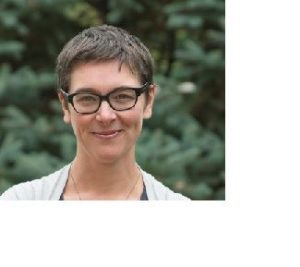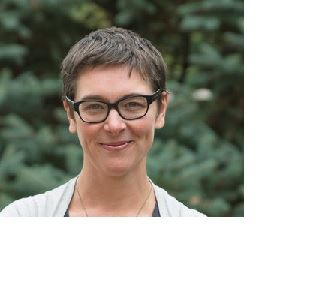by Dennis Dalman
St. Joseph mayoral candidate and current city-council member Anne Buckvold said that getting to know people, what they care about and what they want is the vital requirement for being a leader and getting things done as mayor.
“I believe I have support because I listen to people, and they know I’m committed to representing their concerns . . . .” she said. “I want to be mayor, people want me to be mayor. It is that simple. If elected, I’ll do my best.”
Buckvold, a social worker at Tech High School and the mother of four pre-teen children, was appointed to the St. Joseph Council in May 2018 to fill a seat that had been held by Matt Killam, who resigned when he moved from the city. Six months later, she was elected to the same seat, winning handily over the other candidates. Previously, in 2016, she had entered the race for State House representative for District 13A, but incumbent Jeff Howe won re-election.
Buckvold has served and still serves on many boards and committees. Among them are St. Joseph Park Board, Coalition of Greater Minnesota Cities, St. Joseph Hiring Committee, Metrobus Advisory Committee, Stearns County Human Resources, developing and training community leaders to advocate for extending Northstar commuter rail to St. Cloud, and a community organizer for ISAIAH, which is a local faith organization for social, racial and economic justice. During her outreach work, she developed relationships in the local Muslim community.
“If you want to be a strong leader, someone who gets things done, you need to know people, you need to know what they care about, what they want,” she said. “That was my work. It brought me to the state Capitol on countless occasions. I became familiar with the workings (and non workings!) of state government.”
When she first moved to St. Joseph almost 15 year ago, Buckvold worked as volunteer and events coordinator for St. John’s Prep School. She also operated a daycare business for three years, worked as a mental-health counselor at Madison Elementary School for a year and was then hired as a Tech High School counselor.
Born and raised in the Minneapolis area, Buckvold has an undergraduate degree in social pedagogy from a university in Denmark and a master’s degree in social work from the University of Maine. She also spent a year studying in Greenland. For two years, she worked at Concordia Language Village in Bemidji.
Buckvold addressed St. Joseph’s challenges and opportunities. Despite the Covid-19 crisis, the city has adjusted to its many impacts quite well, she said, adding that progress continued through the hardships. She mentioned some of them: some business re-openings, the Flour and Flower Bakery opening, the start of the first Black-owned business (a restaurant named Krewe) that gained positive stories in the New York Times, a shared-bike program between Waite Park and St. Joseph.
“St. Joseph was becoming more of a destination before the pandemic,” she said. “I can’t see why we wouldn’t continue to be. We just have to be thoughtful about how to navigate and continue our growth.”
Other challenges, she said, are the council needing to put back on its priorities list for bonding a pedestrian underpass across CR 75 and the need to work more on security for individuals and families: greater affordability of housing, improved public transportation, job opportunities and strengthened education.
Much societal polarization has been occurring due to the pandemic, Buckvold said she believes.
“My goal is to decrease polarization and get people to focus on what is in their control. Focusing on anything but that just raises tension and anxiety, which is something I don’t think any of us benefits from and especially not now.”
More requests from businesses for CARES funds have been received, she noted.
“We are going to get more through the winter so we need to prepare for that. Again, in my view, the impact of the pandemic is really calling the question on so many levels of how we primarily White and middle class have lived and expect to live.”
A community center will definitely benefit St. Joseph, Buckvold said, adding residents will have to decide what it should look like, what it will provide. Once it’s built, there will be a tax levy for it, she said.
Strangely enough, the pandemic has brought opportunities for stronger social bonds, Buckvold said she believes. For example, she mentioned the relationships between St. Joseph and the two area colleges.
“Historically, it (relationship) has been strained and even tense at times,” she said. “I don’t think it needs to be. It’s not that I think an opportunity (for better relationships) didn’t exist without a pandemic. It did. But now I think everyone everywhere is rethinking things, evaluating what really matters, what resources we really have that we haven’t used. Institutions (colleges, for example) are doing that too.”
Buckvold said she is amazed by how St. Joseph is such an engaging city: the Joetown Rocks festival, successful for a decade; the Winter Walk; the Small-Shop Crawl, Millstream Arts Festival, Rock for Alzheimer’s; Fourth of July celebration; farmers markets, to name just some.
“The list goes on,” she said. “I just think it’s awesome.”
What does Buckvold care most about in regards to St. Joseph?
“I care about everything because I care about the people,” she said. “Anything that is touching this town, good or bad, what a resident wants more or less of, if they have a good idea, I want to hear about it. It makes the job of serving the people so much easier. I want to be sure there is gravity to any political conversation I am a part of, meaning that it is about real and substantial issues, the things that affect our lives.”

Anne Buckvold




